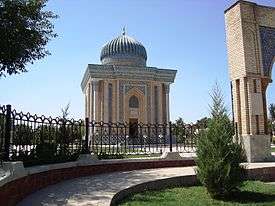Abu Ishaq al-Saffar al-Bukhari
Abu Ishaq al-Saffar al-Bukhari (Arabic: أبو إسحاق الصفّار البخاري), was an important representative of the Sunni theological school of Abu Mansur al-Maturidi (d. c. 333/944) and the author of Talkhis al-Adilla li-Qawa'id al-Tawhid (Arabic: تلخيص الأدلّة لقواعد التوحيد) which is a voluminous kalam work.[4][5][6]
Abu Ishaq al-Saffar al-Bukhari أبو إسحاق الصفّار البخاري | |
|---|---|
| Title | Rukn al-Islam (the Pillar of Islam)[1] |
| Personal | |
| Born | 460 A.H. = 1067-8 A.D.[2] |
| Died | 534 A.H. = 1139 A.D. |
| Religion | Islam |
| Era | Islamic Golden Age |
| Region | |
| Denomination | Sunni |
| Jurisprudence | Hanafi |
| Creed | Maturidi[3] |
| Main interest(s) | Aqidah, Kalam (Islamic theology), Fiqh (Islamic jurisprudence) |
| Notable work(s) | Talkhis al-Adilla li-Qawa'id al-Tawhid |
| Muslim leader | |
Influenced by
| |
Influenced
| |
He lived in Bukhara under the dominance of West Karakhanids. His theological works, his method in kalam, and frequent reference to his works by Ottoman and Arab scholars indicate that al-Saffar is a respected and authoritative Hanafi-Maturidi theologian who systematically establishes his ideas about kalam believing that information based upon reason, revealed knowledge and senses are determinative in his area.[7][8]
Name
Abu Ishaq Ibrahim b. Isma'il b. Ahmad b. Ishaq b. Shayth, known as al-Zahid al-Saffar.[9][10]
The alternative name Ibrahim b. Ishaq, recorded by Brockelmann in his GAL, is found only in the British Museum manuscript no. 1577, Add. 27526, and is presumably erroneous, since the few biobibliographical sources that mention al-Saffar call him Ibn Isma'il.[11][12]
See also
References
- "Al-'Alam by al-Zirikli". shamela.ws.
- "Hadiyyat al-'Arifin by Isma'il Pasha al-Babani al-Baghdadi". islamport.com.
- Adam Hani Walker, Coeli Fitzpatrick Ph.D. (2014). Muhammad in History, Thought, and Culture [2 volumes]: An Encyclopedia of the Prophet of God. ABC-CLIO. p. 523. ISBN 9781610691789.
- "The Contributions of Alī b. Uthmān al-Ūshī to Māturīdī Kalām". KIRGIZİSTAN OŞ İLAHİYAT FAKÜLTESİ DERGİSİ.
- "An important source of the Maturidi legacy: al-Bukhari al-Saffar". H-Net Discussion Networks.
- "A study of Bukhari's scholastic theology (Ibrahim Ibn Isma'il) Talkhis al-adilla, being a treatise on Hanafi scholastic theory". E-Theses Online Service.
- "Abū Ishaq as-Saffār's Kalam Method". ISAM - Center for Islamic Studies.
- "Māturīdī Theologian Abū Ishāq al-Zāhid al-Saffār's Vindication of the Kalām". PhilArchive: The Philosophy E-Print Archive.
- "Hadiyyat al-'Arifin by Isma'il Pasha al-Babani al-Baghdadi". islamport.com.
- "Abū Ishaq as-Saffār's Kalam Method". ISAM - Center for Islamic Studies.
- "al-Ṣaffār al-Bukhārī" (PDF). İSAM Kütüphanesi - Veri Tabanı.
- "al-Ṣaffār al-Bukhārī". Brill Online Reference Works.
| |||||||||||||||||||||||||||||||||||||||||||||||||||||||||||||||||||||||||||||||||||||||||||||||||||||||||||||||||||||||||||||||||||||||||||||||||||||||||||||||||||||||||||||||||||||||||||||||||||||||||||||||||||||||||||||||||||||||||||||||||||||||||||||||||||||||||||||||||||||||||||||||||||||||||||||||||||||||||||||||||||||||||||||||||||||||||||||||||||||||||||||||||||||||||||||||||||||||||||||||||||||||||||||||||||||||||||||||||||||||||||||||||||||||||||||||||||||||||||||||||||||||||||||||||||||||||||||||||||||||||||||||||||||||||||||||||||||||||||||||||||||||||||||||||||||||||||||||||||||||||||||||||||||||||||||||||||||||||||||||||||||||||||||||||||||||||||||||||||||||||||||||||||||||||||||||||||||||||||||||||||||||||||||||||||||||||||||||||||||||||||||||||||||||||||||||||||||||||||||||||||||||||||||||||||||||||||||||||||||||||||||||||||||||||||||||||||||||||||||||||||||||||||||||||||||||||||||
